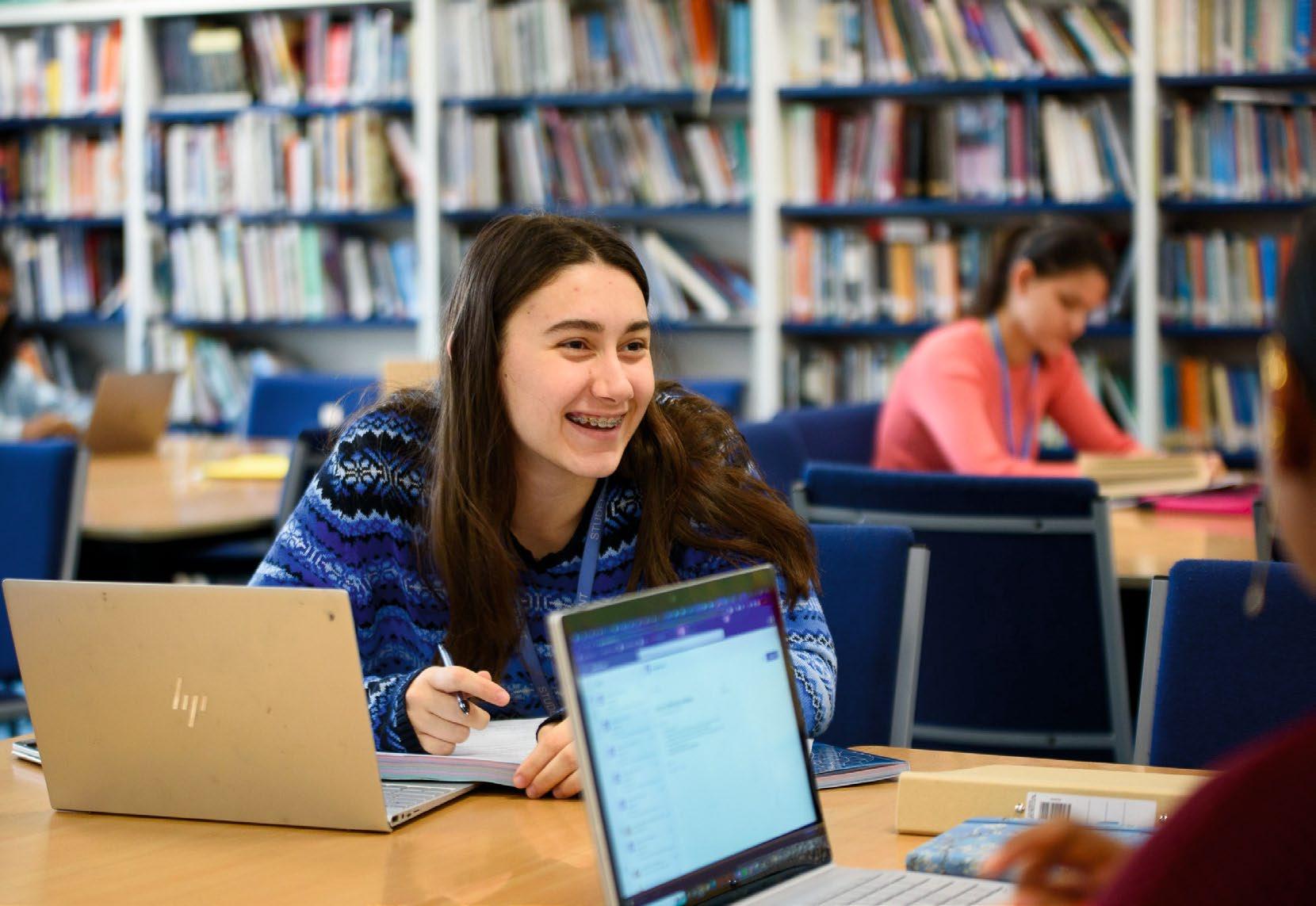

Ewell



Ewell
Art is everywhere. We live in a predominantly and everincreasing visual society where visual communication and understanding is vital. Employers increasingly seek those who can exercise initiative, adaptability, independent judgement and creative problem solving which are the attributes that art and design students have in abundance. The UK produces extremely talented artists and designers who work in world-leading industries. The study of Art & Design will develop your creativity, visual learning, motor skills, decision making, perseverance, focus, collaboration, accountability, improve confidence and has been scientifically proven to improve academic performance. It’s not just drawing and painting!
What can I expect?
We follow the AQA Fine Art endorsement (full linear course). Two components of work are created over the two year course; the Personal Investigation and Portfolio (September in Year 12 to January in Year 13) and the Externally Set Assignment in Year 13 (February to May) culminating in a 15 hour practical exam. We work in a self-directed route, engaging in personal lines of visual enquiry and developing individual technical skills to expand your creativity and imagination and develop a personal style. You will explore the use of drawing for different purposes, using a variety of methods and media on a variety of scales. You will use sketchbooks/journals to underpin your work where appropriate to accompany each component and you will be aware of the importance of process as well as product.
You will develop an understanding and appreciation of aspects of the history of Art and Design and this should lead, inspire and enhance your own work. You will explore relevant images, artefacts and resources relating to a range of art, craft and design, from the past and from recent times.
With the removal of exams at the end of Year 12, this will give us more time for practical studio work and critical and contextual research, gallery visits and workshops to explore a range of materials and processes.
Students usually progress to degree courses in Art & Design through application to a Foundation course. This in turn gives students a broader understanding of the wide variety of specialisms available at degree level. The choice of further study is extraordinary with new courses emerging year-on-year with the advance of creative technologies. Career paths include: creative technologies, fashion, interior design, web and digital design, textile design and manufacture, graphic communication, animation, conservation and restoration, history of art, curation and education, film and television, product design, photography, 3D design, advertising, marketing, journalism, set design, stylist, special effects, industrial design…the list goes on!

Why I chose Fine Art...
“I wanted a creative subject to support my other endeavours in learning, and art allows me to think even more critically and engage with the world in a unique, out of the box way. I enjoyed it at GCSE and thought it would be useful for future prospects as well.”
What I like best about the course...
“I enjoy how we can take initiative in what we explore, meaning I am able to explore the pathways of art that I enjoy personally. It has allowed me to explore media I usually wouldn’t think to use.”
Where I hope it will take me…
“I hope to go into a creative field like journalism or media, so art has enabled me to critically think, as well as providing an unconventional approach to the journalism field. Though I don’t want to go directly into fine art, the fine art A Level allows an exploration of creativity I can apply outside of the classroom.”
Biology is a vast and varied subject which includes the study of living things from minuscule microorganisms right the way up to human beings and beyond. The course aims to develop your interest and enthusiasm for Biology and hopefully inspire you to further study or careers in Biology. In addition we want to develop your understanding of how different areas of Biology relate to each other and help you to apply this understanding to unfamiliar situations. It encourages students to appreciate how society makes decisions about scientific issues and how Biology contributes to the success of society and the economy. In the course you will develop and demonstrate a deeper appreciation of the skills, knowledge and understanding of How Science Works.
We follow the OCR Biology fully linear course, with assessment being on a terminal exam at the end of two years. We study the following topics:
• Development of practical skills
• Foundations in Biology
• Exchange and Transport
• Biodiversity, evolution and disease
• Communication, homeostasis and energy
• Genetics, evolution and ecosystems
We run a field trip to Camber Sands during Year 12, which provides an excellent opportunity to develop fieldwork skills and ensures students are able to meet the required practical skills which are difficult to gain in a laboratory environment.
All A Level students are encouraged to participate in the Biology Olympiad and we run a support club to help all students with any questions they have or clarifications that are needed. There is also an opportunity for students to enter the Homerton College Cambridge Biology Challenge.
There are many options available for further study at university. These include medicine, dentistry, veterinary science, biochemistry, biological sciences, microbiology, psychology, nursing, pharmacology, physiotherapy, environmental science amongst many more options.
“I chose Biology because it was one of my favourite subjects at GCSE. I really enjoy the practical nature of Biology – the processes that you study are happening inside and around us all of the time and I wanted to develop my understanding of this/Biology also covers a wide range of topics, with applications in many careers. The support and resources provided by the biology department drew me to the subject as well.”
“I really enjoy human biology and learning about organs and tissues. We had the opportunity to look at a dissected heart and lungs which was one of my favourite lessons. I also enjoy the way biology focuses on the practical application of GCSE chemistry and physics too which has improved my lateral thinking skills. The experiments involved in the Biology course makes lessons fun and interesting.”
“As a prospective medical student, Biology A Level has provided a firm foundation for my future. The topics studied at A Level will provide a solid basis for studying many STEM degrees. However Biology is not just an A Level for future medics. Many students in my class plan on studying a variety of different courses, including humanities degrees. The research skills taught as part of the course are essential for any degree or job, whilst the ability to understand and use specific terminology has use in many types of degree.”
Completing an A Level in Chemistry can open so many doors for you in the future. It is a challenging, academic and rigorous A Level that will impress a lot of universities and future employers. Studying A Level Chemistry can lead to many careers in healthcare such as medicine, pharmacy and dentistry but is also extremely useful in careers in the biological sciences, veterinary science, physics, mathematics, pharmacology and analytical chemistry. Did you know that chemists are also involved in many other areas, such as Law, Art Restoration, Forensic Science, Sport & Fitness Training, Conservation, Photography and the formulation of cosmetics and perfumes?
We follow the OCR Chemistry A fully linear course, with assessment being on terminal exams at the end of two years. We study the following topics:
• Development of practical skills
• Foundations in Chemistry
• Periodic Table and energy
• Core Organic Chemistry
• Physical chemistry and transition elements
• Organic chemistry and analysis
With the removal of exams at the end of Year 12, this will give us time to consolidate material on to University level and provide opportunities to make exceptional progress. All A Level students are encouraged to participate in both the Chemistry Olympiad and the Cambridge Chemistry Challenge. We run a ‘Stretch and Challenge’ Club for students to pursue their studies to the highest level.
The choice of further study is vast, e.g. medicine, dentistry, veterinary science, biochemistry, pharmacology, biological sciences, microbiology, psychology, nursing, physiotherapy, speech therapy, forensic science and many more. Chemistry degrees are well respected for general graduate careers and PhD studies.

“I chose Chemistry because of the valuable skills I aimed to develop through studying it. For example, I have strengthened my analytical skills when identifying organic compounds, enhanced my numerical abilities through mole calculations and rate equations in physical chemistry, and improved my problem-solving abilities when tackling synoptic questions. I have found that these skills have benefited me in my other subjects, where similar strengths were needed. Additionally, I find Chemistry fascinating because it connects to a wide range of industries, from engineering to medicine, making it a versatile and impactful subject to pursue.”
“I thoroughly enjoyed learning about coloured compounds in transition metals. As an art enthusiast, I found it especially appealing to understand the principles behind where colour originates. It was interesting to connect my passion for art with chemistry, which opened my eyes to the real-life applications of the subject. This curiosity encouraged me to further research into dyes and pigments in my own time. I also found the practical work in chemistry engaging, particularly observing how different solutions caused visible colour changes in transition metal complexes and forming benzoic acid crystals.”
“I would like to study Chemistry at university to broaden my existing knowledge and deepen my understanding of the subject. A Level Chemistry played a significant role in sparking my interest, as it explored chemical principles and the reasoning behind theories introduced at GCSE. I believe that pursuing an undergraduate degree in Chemistry will allow me to develop this understanding further and apply it when choosing a career path. I am especially excited about the opportunity to work in laboratories and use analytical techniques, such as infrared spectroscopy, which I have studied in class and am eager to experience in practice.”
Classical Civilisation focuses on the ancient civilisations of Greece, Rome and beyond, taking in a wide range of literature, art and architecture, philosophical thought and historical context. You don’t need to know any languages because all texts are in translation. All you need is an interest in the ancient world and its cultures.
In Year 12, Students begin with a compulsory module, ‘The World of Hero’. We focus on Homer’s Odyssey (and parts of the Iliad) and Virgil’s Aeneid. These epic poems describe the adventures and exploits of the founding Heroes of Greek and Roman culture: Greek Odysseus in Homer and Trojan Aeneas in Virgil. Both face travels, monsters, love and war after the fall of Troy. We study how these narratives, motifs and values informed and reflected Greek and Roman identity.
We continue in Year 12 by covering the interplay between Greece and the Persian Empire in ‘The Invention of the Barbarian’*. We study Greek drama in Aeschylus’ The Persians, and Euripides Medea, Herodotus’ account of the Greco-Persian Wars, and Greek art depicting historical and mythological figures from the immediate East. We go further, however, by exploring architecture, art, artefacts and inscriptions from Ancient Persia, including the Oxus Treasure, the site of Persepolis and the Bisitun (Behistun) Rock Relief.
Finally, in Year 13 we study ‘Love and Relationships’* in the Classical World. We draw upon philosophical thought on love and desire from Greek Plato and Roman Seneca as well as literary expressions of love in the lyric poetry of Greek Sappho and the elegiac verse of Roman Ovid. We concern ourselves with the poets’ use of literary techniques and mythology to express love and desire within the social and cultural contexts of the time.
*The latter two modules, ‘Barbarian’ and ‘Love’ are optional alternatives. Students may prefer to direct the focus of study elsewhere, e.g. to topics such as Greek Drama or Politics in the Late Roman Republic. There are many opportunities beyond study: essay competitions; local lecture visits; museum visits or other trips.
Classical Civilisation A Level supports university studies across the Humanities: Modern and Ancient Languages, History, Archaeology, Philosophy, English, Law and Politics. Indeed, any degree subject requiring rigorous research and essay-writing will benefit from Classical Civilisation skills. It encourages close examination of textual and material sources and sophisticated critical expression. Such transferable skills are highly sought-after job sectors from business consultancy to media production.
“Classical Civilisation – or “Classics” – allows me to deepen my interest in Ancient Greek and Roman cultures and history through their literature and art. Fascinating parallels can be drawn between ancient and modern, allowing for a deeper understanding of how we got to the present day and current events.”
“There’s something for everyone! Whether you’re interested in politics, history, literature, philosophy, linguistics, visual and performance arts, architecture and many other disciplines, Classics has something to offer. The sources we study are vivid and cover essential human experiences like conflict and duty, love and loss, beauty and the pursuit of truth. No lesson is ever boring!”
How I think it will benefit me…
“Studying Classics alongside Languages and History has taught me to improve my analytical and argumentative skills. I am learning to draw my own interpretations of sources and writing persuasively about my opinions. These skills are essential for success in further education and highly sought after by universities. Classical accomplishments and institutions can be thought of as foundational for many aspects of modern life, helping to explain why our society is the way it is.”
Advances in computing are continually transforming the way we learn, work and live. A Level Computer Science is relevant, valuable and interesting. The course focuses on the knowledge, skills and understanding that students need to progress to higher education or to thrive in an IT environment. One can study Computing and go on to a career in medicine, law, business, politics or any type of engineering or science. A Level Computer Science features as a useful A Level subject in the Russell Group’s ‘Informed Choices’, for many scientific and engineering degrees.
We follow the OCR Computer Science (H446) fully linear course, with assessment being at the end of two years made up of two exams and a project.
The main areas covered are:
Computer systems – looking at characteristics of contemporary processors, input, output and storage devices; software and software development; exchanging data between systems; data types, data structures and algorithms and consider legal, moral, cultural and ethical issues.
Programming – looking at elements of computational thinking, problem solving, programming constructs, standard algorithms and how to use algorithms to solve problems. While we will learn using C#, the exams do not require the use of any particular programming language, focussing on the understanding of principles instead. The emphasis is on computational thinking. This requires abstraction and decomposition. The study of computation is about what can be computed and how to compute it. Computer Science involves questions that have the potential to change how we view the world.
The final project will enable you to develop your interests in the world of Computer Science in any direction you like, while having the opportunity to apply the skills learnt in class and go beyond the curriculum to enhance your skills and understanding. This can be completed using any programming language allowing you to develop and hone skills in most mainstream languages.
Computer Science can open most doors. The skills you learn demonstrate your ability to think analytically, critically and logically. Careers reach from research and development into new technologies, to data efficiency and environmental improvements. At management level, having the ability to mediate between clients and technical teams is highly desirable.
No, but you should have a grade 7 or above in Maths and be willing to work hard at the start to learn the basics of programming and theory that were already covered.

“I chose to study Computer Science at A Level because I’ve always been fascinated by how technology works and how it’s used to solve real-world problems. After really enjoying the subject at GCSE, I wanted to deepen my understanding of programming, algorithms, and the logic that underpins modern computing.”
“The best part of the course for me is the direct application of theory – I particularly enjoy the way the curriculum encourages thinking strategically, breaking down large problems into simple, manageable steps. Computer Science also encourages analytical thinking and precision, which are skills that apply far beyond the classroom.”
“Every major industry, from finance to healthcare, is now underpinned by sophisticated digital systems, and I hope that this will be beneficial in the future. I’m especially interested in how computing is driving innovation in areas like AI, cybersecurity, and data science, and I believe this A Level will give me a strong foundation for future study or a career in technology.”
As Shakespeare so eloquently writes, ‘All the world is a stage, and all the men and women merely players.’ Drama and Theatre Studies is an exciting, practical and academic course that allows you to get the key communication skills needed to succeed in life. Through exploration of playwrights, practitioners and genres pupils will work as a production company to produce interesting and innovative interpretations of key plays.
We follow the AQA Drama fully linear course, with assessment being broken into 3 components:
Component 1: Interpreting Drama: Written Exam:
• Two set texts which will be practically explored. One text will be pre 20th century and the second text will be post 20th century. The set text questions are open book.
• A production explored practically and seen live.
Component 2: Creating Original Drama:
• This is a devised unit of work in which a completely original piece of theatre is created. This is influenced by one theatre practitioner.
• A working notebook will be kept and assessed.
Component 3: Making Theatre:
• A practical exploration of three chosen plays. The third extract will be performed to an external examiner.
You will develop:
• The practical skills of voice and body language
• Understanding of key theory
• Analytical and evaluation skills
• Performance and rehearsal techniques
• Production elements
Where could it lead?
The choice of further study is vast, e.g. medicine, law, teaching, stage craft, production, acting, costume design, sound production – the list is endless.

“I chose to study A Level drama because of my passion for performing as well as the vast range of transferable skills it teaches you. It’s a fantastic opportunity to develop confidence in public speaking and when devising, you build up key teamwork and creative thinking skills which transfer directly into any field of work. Additionally, I am extremely interested in understanding a wide range of people. Through studying, creating and performing a vast selection of characters, I feel better able to empathise with others and use this to inform my performances.”
“My favourite aspect of A Level drama is the freedom we are given to tailor the course to our strengths and interests. When completing the devised and scripted elements, we have the opportunity to make suggestions and choose topics we are interested in to explore. The staff and students are so supportive of each other and never miss an opportunity to encourage each other. Drama is such a wonderful opportunity to continue developing written communication skills while simultaneously developing valuable problem solving and the ability to think outside of the box.”
“I hope to pursue an English and Theatre degree at university and my A Level drama lessons have been one of the key elements which has inspired me to apply for this course. Studying a wide variety of plays from a dramatic and creative perspective has enhanced my ability to analyse them in an English setting. I hope to work in the theatre industry as the Drama department at Nonsuch have instilled in me a love for performing and have always supported me in working towards this goal!”
This creative and thought-provoking qualification gives students the practical skills, theoretical knowledge and confidence to succeed in a number of careers. Especially those in the engineering and creative industries. They will investigate historical, social, cultural, environmental and economic influences on design and technology, whilst enjoying opportunities to put their learning into practice by producing prototypes of their choice. Students will gain a real understanding of what it means to be a designer, alongside the knowledge and skills sought by higher education and employers.
We follow the AQA Design and Technology: Product Design full linear course. Areas that will be studied include:
• Technical principles
• Designing and making principles
• Practical application of technical principles, designing and making principles.
Students are encouraged to be open to taking risks, showing innovation and enterprise whilst considering their role as responsible designers and citizens.
The choice of further study is vast. You could study a BA, BEng or BSc in areas like engineering, architecture, designing and manufacturing, STEM, as well as careers in the creative industries.
Design and Technology compliments other A Level subjects including Maths, Physics, Chemistry, Computer Science and Art.
Design and Technology is a great subject to study for jobs that require problem solving and practical skills and demand for people in these work areas is growing.
Any career in the creative or scientific industries including;
• Design • Engineering
• Architecture
• Business
“I chose Product Design as I enjoy the creative freedom in these lessons compared to other subjects.”
“DT gives you space to put your creative mind into practice. It has helped me to use modelling effectively and design iteratively.”
“I enjoyed Product Design at GCSE and wanted to develop my knowledge further. I like the creative aspects that the subject brings.”

“I like the theory best as I enjoyed learning about materials and how products are manufactured.”
“I like the NEA side to product design best, as it lets me create my own products.”
“I am hoping to pursue a career in architectural engineering.”
“DT allows me to explore and improve my creative and problem-solving skills which will help me in the future when studying Architecture at university.”
Economics is about choice and the impact of our choices on each other. It relates to every aspect of our lives; from the decisions we make as individuals or families to the structures created by governments and firms. The economic way of thinking can help us make better choices.
We follow the Edexcel Economics linear course, with assessment being on a terminal exam at the end of two years. We study the following topics:
Markets and market behaviour
• Economic methodology and the economic problem
• Individual economic decision making
• Price determination in a competitive market
• Production, costs and revenue
• Perfect competition, imperfectly competitive markets and monopoly
• The labour market
• The distribution of income and wealth: poverty and inequality
• The market mechanism, market failure and government intervention in markets
The national and international economy
• The measurement of macroeconomic performance
• How the macro-economy works: the circular flow of income, AD/AS analysis, and related concepts
• Economic performance
• Financial markets and monetary policy
• Fiscal policy and supply-side policies
• The international economy
Most students gain access to university normally taking an Economics or Business-related degree. A number have gone into careers in commerce, banking and financial service industries and working for the Government.

“Read any newspaper and you will have no shortage of economic issues and questions, that’s why I wanted to study Economics.”
“Economics is the only social science awarded the Nobel Prize. Economics is a rich intellectual tradition, and the economic way of thinking gives you a distinct voice in the choices faced by society.”
“As well as Economics I study Computer Science and Mathematics. At university I want to read Economics.”
English Literature is a gift for the rest of your life. The texts you study and characters you meet stay with you, even change you. Like GCSE, it invites you into the mind of the writer by discussing and interpreting why words or phrases are used and developed and how texts are shaped by their contexts. Unlike GCSE, the focus is more on argument and interpretation and so almost all exams are open book. An A Level in English Literature sharpens your skills to construct and develop precise and persuasive arguments within a well-built and cogent essay and within your life.
What can I expect?
We follow the AQA English Literature Specification A fully linear course, with there being a terminal exam at the end of two years. The following units will be completed:
Paper One – Love Through the Ages
• Section A – Shakespeare: one passage-based question with linked essay
• Section B – Unseen poetry: compulsory essay comparing two unseen poems
• Section C – Comparing texts: one question linking two set texts (one of which must be pre-1900) – clean copies of texts can be taken into the examination
Paper Two – Texts in Shared Times Option 2B Modern Times: Literature from 1945 to Present Day
• Section A – Set text: one essay question on set text
• Section B – Contextual linking: one question on unseen extract, one question linking the remaining set texts
Non-Exam Assessment – Independent Critical Study: Texts Across Time
• Coursework essay of 2500 words comparing two texts of your choice (one must be pre-1900)
Where could it lead?
The study of English Literature at A Level will equip you with a wide range of skills that can be applied to all disciplines and occupations later on. It is very highly regarded by universities and employers because of the rigour and complexity of the skills and knowledge that the subject demands.
It is an excellent foundation subject for a variety of degrees including Law, History, History of Art, Philosophy and Theatre Studies. English is a particularly popular degree for those intending to work in publishing, journalism, television, advertising or teaching, or those who intend to take a Law conversion course after their first degree. Effectively, it is an excellent preparation for the high level communication skills that all school leavers need to succeed in the 21st century.

“I chose to study English Literature because I am particularly interested in understanding people, their experiences and how this is reflected in what they choose to write. I especially enjoy discussing how different viewpoints and critical perspectives may interpret the same extract in different ways. I was particularly drawn in by the course which offers a range of prose, poetry and plays as well as the wide variety of time periods and authors.”
What I like best about the course...
“My favourite elements of English Literature at Nonsuch are the unique learning style and extra-curricular activities. Our lessons are very student led, centring around group discussions and feeding back to the other students in the class which closely mirrors university seminar discussions. There are also a wide range of clubs and societies on offer for sixth form students. As president of the Literature Society, I organise students taking turns to present on a piece of Literature encouraging insightful debate on key themes, techniques and context.”
“I am hoping to study an English and Theatre degree at a Russell group university; English Literature at Nonsuch has prepared me for this course by teaching me key skills such as debate, critical thinking and creativity. Additionally, the department allow their A Level students a great degree of freedom in choosing texts and topics for our NEA. This means we are able to explore texts which we are genuinely interested in. For example, I have been able to study my favourite form of literature – plays.”
Exam Board Pearson
By studying A Level French you will develop a lasting appreciation of the French language, the ability to comprehend the language in a wide range of contexts, the ability to communicate readily in French for a variety of purposes, useful knowledge of and insights into the culture of France and the Frenchspeaking world and valuable skills for foreign travel, further education and employment.
Over 220 million people around the world speak French. French is the official language in 29 countries which puts it in second place behind English.
We follow the Pearson French course, with assessment being on a terminal exam at the end of two years. We study the following topics:
• The evolution of French society
• Culture in the French-speaking world
• Immigration and the French multicultural society
• The National Front
• The Second World War
• Film: Les Choristes
• Text: Un Sac De Billes
All A Level students, in addition to normal lessons, will also have the chance to have individual lessons with our French assistant.
The course will give you a good foundation for further study in higher education. French is in demand in a wide variety of professions including banking, international trade and commerce, import and export, tourism, foreign office, diplomatic corps, teaching, translating, interpreting and many more.

“Having done French and Spanish at GCSE, I felt the need to continue one language at A Level and I cannot wait to speak French fluently.”
What I like best about the course...
“I enjoy being immersed in the French culture. I can already see lots of progress in my listening by simply listening to French news 10 minutes a day.”
“Having done a language at A Level will make me stand out when applying for university. More importantly I look forward to being able to converse with native speakers and also to study other languages.”
Geography is a dynamic and highly relevant subject. Geography is appearing daily on our news screens, with links to the impacts of climate change, how we should reduce our carbon emissions, how to best tackle plastic pollution, managing migration, dealing with global pandemics, how to manage and response to natural disasters, seemingly increasing extreme weather events, sustainability, trade and the economy, geopolitics and geopolitical relationships – learning about Geography has never been more important!
AQA Geography is a fully linear course, with two exam papers sat at the end of Year 13 and a non-examined assessment. We study the following topics:
Paper 1: Physical: (40%)
• Water and Carbon Cycle
• Coastal Systems and Landscapes
• Hazards
Paper 2: Human: (40%)
• Contemporary Urban Environments
• Changing Places
• Global Systems and Global Governance
NEA – Non-Examined Assessment (20%)
• Students complete an individual independent fieldwork investigation based on a question or issue relating to any part of the specification content that they are interested in.
• They must collect primary data as part of this investigation, so students have to complete 4 days of fieldwork as part of the course.
Students have gone to study Geography at a range of universities – Oxford, Cambridge, Durham and Southampton to name a few, with courses focusing just on human Geography (BA) or physical Geography (BSc) as well environmental science, oceanography, international development and geopolitics.
Geography graduates can progress on to a wide range of careers, including finance, commerce and business, local and national government, international relations and development, urban planning, teaching, meteorology, conservation, flooding, renewable energy and journalism!

Erin, Year 12
“I chose to do Geography A Level not only because of how much I enjoyed it at GCSE, but also due to how much variety there is in the subject. Geography offers a mixture of humanities and science that is not greatly available in other subjects, which is a unique positive about studying it. Geography is also incredibly relevant and has helped expand not just my academic knowledge but also my general worldview. What appealed to me was that knowledge from outside of school could be brought into the subject. The department is also incredibly organised and helpful which I have found beneficial for my GCSE and beginning of A Level studies.”

Zarah, Year 12
“I chose A Level Geography because I loved studying it at GCSE and found the case studies and fieldwork investigation very interesting. I was intrigued by the A level course and how we do a broad range of topics that cover all social, economic, environmental and political aspects of Geography as a whole. The NEA also really stood out to me as I enjoyed the investigations we did at GCSE, and now we had more free range to choose what topic we do our NEA on. My Geography lessons along with so many resources for wider reading integrate with my other subjects well and have helped develop my understanding of how the world works at a greater depth.”
Exam Board Pearson
By studying A Level German you will develop a lasting appreciation of the German language, the ability to understand and communicate in German and useful knowledge of and insights into the culture of Germany and the German-speaking world.
Germany today is the political, economic, artistic and intellectual powerhouse of Europe and the European Union. Knowledge of the mother tongue of over 100 million people, (German has the largest number of native speakers in the European Union, more than English, Spanish or French) has never been more important for governments, businesses and private citizens, and students of German are therefore consistently amongst the most sought-after graduates for major employers.
We follow the Pearson German course, with assessment being on a terminal exam at the end of two years. We study the following topics:
• The evolution of German society
• Culture in the German-speaking world
• Immigration and the German multi-cultural society
• East-German society pre-unification
• The Reunification of Germany
• Text: Das Leben der Anderen
• Film: Andorra by Max Frisch
All A Level students are encouraged to take part in a trip to Cologne. In addition to normal lessons, you will also have individual lessons with our German assistant.
The course will give you a good foundation for further study in higher education. German is recognised by universities as a facilitating subject and is in demand in a wide variety of professions including banking, import and export, foreign office, diplomatic corps, international trade and commerce, law, tourism, teaching, translating, interpreting and many more.

“I chose to study German as I really enjoyed the subject at GCSE and wished to further immerse myself in German. Languages are great for personal and professional development, so I wanted to take German to broaden my horizons and boost my skillset.”
“One of the best parts of German A Level is the breadth and depth of knowledge you learn about Germany and the language. You gain a very detailed understanding of current affairs, as well as the history and culture, which I find really valuable. Studying history alongside German means that there is some overlap in the courses, and it’s been fascinating to study events from different angles. The department are also extremely supportive, understanding and helpful, making the transition from the GCSE to A Level course much smoother.”
“I am hoping to study History and International Relations, using what I have learned about Germany to gain a wellrounded and in-depth understanding of its role in the past, as well as in current affairs. As I possibly want to work for the Foreign Office, having learnt a language will be particularly useful.”
The world is in a state of turmoil. Megalomaniacs and egotistic have seized power and are set about dismantling everything we have always thought sacred. Young women of Nonsuch, it’s time to take back control, it’s time to make politics great again!
Study politics, find out about the systems and the people that govern us, evaluate the ideologies available and then determine to set the future course of British political history yourself.
In Year 12 you will study British Politics, examining the systems of government, the people in power, and the nature of democracy that exists here.
In Year 13 you will focus on American Politics and examine the controversies and debates that surround their political system.
Over both years you will study the major political ideologies that exist, conservatism, liberalism and socialism as well as a specific focus on feminism.
Politics doesn’t close doors, nor does it mean you are destined for a career as a politician. Employers respect the academic nature of politics as an A Level or degree level subject as it identifies strong minded, culturally aware and analytically minded individuals. Russell Group universities want more than just grades. They want to find students who are aware of the world, who have opinions and can discuss the matters of the day and nothing will better prepare you for an interview at a Russell Group university than a good understanding of politics.
In the longer-term politics can open up many employment opportunities. However, a large number of politics students have gone to work as journalists, bankers, public relations officers, civil servants and in a wide range of roles for multinational organisation and charities.

“I have always been fascinated by the turbulence of our political landscape. In politics, no two days are the same and through politics A Level, I have been able to understand, analyse and question the ever-changing world around me. For example, guided by my knowledge from the course, I was able to observe and recognise the true impact of the recent general election. That is the beauty of politics; it has a real-world application.”
“My favourite part of Politics is the discussions that we have as a class. Through listening to other people’s ideas and opinions, and understanding how they think, I am able to question my own beliefs and understanding of different issues. Defending my own viewpoint also helps with this. Both have made me consider things I might have not otherwise and considerably changed my worldview in certain aspects.”
“I am looking to study History and Politics at university next year and developing my understanding of basic concepts as well as debating skills has prepared me for that. Understanding other people’s perspectives has helped me develop my empathy and understanding, which will be beneficial for working with people in the future, both in my professional and personal life.”
History is about people. It is the study of the past through compelling stories that tell us about the ideas and events that have been and are destined to be repeated. It will sharpen your ability to think critically, to consider options and make judgements that are based on facts and not opinion. Moreover, history opens doors to future employment. It doesn’t shoehorn you down one career path at the end of A Level but instead opens up a multitude of possibilities to be explored.
We follow the OCR History course, with assessment being based on three exams at the end of year 13. We study the following topics:
• Britain 1930-1997: In this unit we look at the political, social and economic history of Britain in the twentieth century. Students will study the life of Winston Churchill in detail, particularly focusing on his actions as Prime Minister during WW2.
• Democracy and Dictatorship in Germany, 1918-1963: In this unit students will learn about the creation and subsequent collapse of democracy in Germany in the years immediately following WW1. The course will then chart the rise of the Nazi Party until their demise at the end of WW2. Finally, the course will examine the reintroduction of democracy following the war.
• The Tudors 1485-1603: In this unit students will examine the reign of England’s most famous royal dynasty. Our course will consider how they seize the throne in battle and plot the seismic religious, economic and cultural changes that occurred during their reign, whilst examining the continuous threats to their throne from both home and abroad.
• Coursework: Students will be allowed to pursue a coursework option of their choosing.
History doesn’t close doors. Employers respect the academic and critical nature of a history degree and historians can enter virtually any employment that they choose, from lawyers, bankers and civil servants to accountants, investors and politicians. Studying History at A Level and beyond provides you the opportunity to enter virtually any career and gives you the option and time to make an informed choice as to what that career will be.
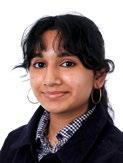
Study Maria, Year 13
“I chose history because it offers a window into how past events have wide-ranging implications in current affairs. It not only challenges me to consider unfamiliar perspectives but also to explore my own interests. For example, in the A Level course we are encouraged to understand how events are open to interpretation by forming our own judgements based on wider reading and classwork.”
“The course has offered me the opportunity to expand on skills that I developed at GCSE, such as critically examining sources and exploring historian’s perspectives. I have enjoyed doing this in my history coursework, in which I have been able to pick my own topic, the Troubles in Northern Ireland. By conducting my own research, I have been able to appreciate the role historical figures played in influencing current political issues. The content offered has also been fascinating, as a range of time periods are studied which has broadened my own knowledge of history.”
“Studying history has offered me the opportunity to improve my critical thinking and debate skills. Being constantly challenged by different points of view has enabled me to be more receptive to other ideas while also improving my communication which will provide a solid base for when I go on to study history at university.”
Mathematics is a rigorous and challenging subject to choose at A Level and is a strong addition to any university or job application. Over the duration of the two-year course, you will encounter familiar topics from GCSE that are extended naturally as well as brand new topics such as calculus and logarithms that are crucial to the study of advanced mathematics. The qualities of a successful A Level Maths student are an inquisitiveness to learn in more depth about the subject as well as the drive to challenge themselves to develop a higher level of problem-solving ability that is required at this level.
We follow the Edexcel specification. There are three terminal examinations at the end of Year 13. Two of them are based around Pure Mathematics with the third examination being a combined Mechanics and Statistics course. Some of the topics over the course of the two years will include:
• Calculus – Differentiation and Integration
• Logarithms
• Vectors
• Trigonometry
• The Laws of Motion
• The Normal Distribution
Students will require a new calculator for this course. The recommended model is the Casio Classwiz FX-991 EX which is available at many online retailers.
A Level Mathematics forms a pivotal part of an application for many different university courses. Whilst an obvious requirement for admission to Mathematics degree programmes, a Mathematics A Level also forms a critical part for admissions to degree courses such as Engineering, Physics and Economics.
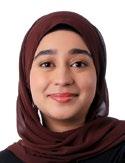
Laiba: “I chose maths as I liked how it made me think differently compared to my other GCSE’s and how satisfying problem solving was, and I knew it was something I would enjoy at A Level.”
Isabella: “I thoroughly enjoyed how it stimulated my brain and would offer a chance to broaden my interests in Maths.”
Laiba: “I really enjoy when topics link between each other and how this challenges my thinking. I also like how it is relatively easy to revise once you understand.”
Isabella: “The best thing about the course itself is how all the different topics interlink and build on each other like multiple levels of a puzzle.”
Laiba: “I hope that I am able to apply the same concepts and critical thinking skills I’ve gained from this A Level in my future careers and always look at different perspectives logically.”
Further Mathematics is a separate qualification to Mathematics A Level and involves studying other areas of mathematics that are more challenging than the normal Maths A Level. This qualification is designed for students for whom mathematics is unquestionably one of their favourite subjects and a subject for which students have a high level of natural ability at and a consistent track record of high performance throughout their school life.
We follow the Edexcel specification. There are four terminal examinations at the end of Year 13. Two of the papers will be in Further Pure Mathematics, one will be in Further Statistics and one will be in Further Mechanics. Some of the topics covered include:
• Complex Numbers
• Matrices
• Hyperbolic Functions
• Trigonometry
• Central Limit Theorem
• The Normal Distribution
• Momentum and Impulse
Further Mathematics requires a substantial amount of independent study that should not be underestimated by potential students.
A Level Further Mathematics forms a pivotal part of an application for many different university courses. Further Maths is a requirement for Mathematics degree courses at some leading universities. It is also a highly prized qualification for degree courses such as Engineering, Physics and Mathematics.

Dara: “I was interested in pursuing maths at a greater level. I enjoyed it at GCSE and felt that it would be positive to do as it meshed well with the other subjects I chose.”
Hasi: “The syllabus for Further Mathematics at A Level sparked my interest and the content looked great.”
Dara: “I have enjoyed how Further Maths covers topics we have never even seen before like imaginary numbers. I like how the content extends my understanding of topics from A Level.”
Hasi: “The challenge, the links between topics, and working on and solving difficult questions is incredibly satisfying.”
Dara: “I hope to do a joint mathematics course, most of which encourage Further Maths at A Level. I see myself doing maths in a future career.”
Hasi: “It is for the love of the subject that I have studied it.”
Music is a challenging subject to study, the value of which is recognised by all highly academic universities, particularly Oxbridge and the Russell Group. It develops a range of cross-curricular skills, including in-depth critical analysis, creativity, dedication and collaboration. Music works well in combination with many different subjects – it is often favoured as a creative option amongst Sciences/Maths, but also compliments other artistic and humanities subjects such as English, History, Languages etc.
We follow the Edexcel Music A Level course, with final assessment occurring at the end of the two-year period. The course consists of:
• Performing – solo skills (Assessment Objective 1)
• Composing – composing music and learning about harmony (Assessment Objective 2)
• Appraising – developing aural and analytical skills through the study of 13 set works (Assessment Objective 3 & 4)
All components are externally assessed.
It is a requirement that all A Level students participate in the school’s extensive extra-curricular music schedule and undertake peripatetic instrumental lessons outside of the school classroom in their firststudy instrument.
Students must also have grade 7 or above in GCSE/ IGCSE Music and at least Grade 6 in their first-study instrument. It is preferential for students to have also achieved their Grade 5 Theory exam.
Of students graduating with a Music degree, 50% go on to careers in completely unrelated fields: science, IT, welfare, business, administration or public service; 25% become teaching or education professionals, and 25% find employment in artistic, literary and media occupations.
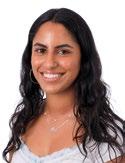
“I really love performing multiple genres of music and so appreciated the chance to deepen my musical understanding and knowledge while having opportunities to perform and take a leading role in the Nonsuch music department.”
“I like the fact that the course is not just pure theory, but weights performance and composition heavily as well. However, I also like that the theory I learn and set works I analyse link back to my practical performance and so help improve my overall musicianship.”
“No matter what career path I choose, I hope to be involved in music in my day-to-day life, as it ultimately brings joy and purpose to me. I hope to be able to perform in solo and in ensembles regularly, using the skills I have gained from music A Level. Music has improved my resilience and determination and has given me skills that are applicable to all parts of my life.”
It is fascinating and enlightening! Not only will you develop a deeper knowledge and understanding of a key world faith, philosophy and ethics but you will also gain many valuable transferable skills along the way. It gives the opportunity to explore some of the biggest issues that have ever challenged humanity in the search for truth, justice and meaning. The course is excellent for developing clear, concise, thinking skills with incisive analysis and evaluation. In the world of work, employers look for someone with an enquiring mind, an appreciation of different viewpoints and an ability to come to clear, balanced decisions. These skills are emphasised and developed throughout the course.
We follow the OCR fully linear course, with assessment being on a terminal exam at the end of two years. We study three broad areas:
Philosophy – a variety of fascinating topics, including the nature of the mind, body and soul, the thinking of ancient Greek philosophers, arguments for and against the existence of God, and whether we can truly claim to know anything.
Ethics – Ethical arguments about different ways to know if actions are right or wrong, such as Natural Moral Law, Situation Ethics and the ideas of Kant. You will also apply ethical theories to real world issues such as euthanasia.
Developments in Christian Thought – topics including the self, human nature, death and the afterlife, gender and sexuality and expressions of religious identity. It is a very thought-provoking subject with excellent opportunities for debate.
Philosophy & Ethics is a valuable entry qualification to higher education opportunities. All universities regard Philosophy & Ethics as an academic subject and accept and welcome students with this qualification onto a variety of courses. A qualification in Philosophy & Ethics is considered an asset in many careers particularly those involving working with people e.g. journalism, politics, law, teaching, medicine and publishing.

“I chose this subject to enhance my understanding of religion, the history behind it and how it has developed over time, as well as to gain experience debating philosophical and ethical questions. I love that the course is not centered fully on religion but is more about applying specific lenses and viewpoints to questions asked, allowing us to fully engage with and relate to the content of the course. It is also an excellent to have a class which is fully discussion based and not too heavy on the writing element, as it allows us to talk through everything and ensure we fully understand it.”
“My favourite aspect of this course is the ability it gives us to debate topics in a relaxed, casual environment, allowing us to feel comfortable with enough with our classmates to discuss the topics at hand. It also goes without saying that the content within the course is extremely interesting, meaning that no lesson is ever dull as there is always something to discuss or think about. The teachers on the course are excellent, again allowing us to feel comfortable and able to debate confidently in the environment created by them.”
“I intend to go into theatre and performance in the future, and studying philosophy and ethics has helped me to gain a better understanding of the beliefs and perspectives of others, which is crucial when acting. It has also assisted me in understanding and coming to terms with my own beliefs, which is an essential factor of my own personal development. I have also learnt incredibly useful essay and debate skills which will assist me throughout university and life after, as the ability to clearly communicate is vital in the working world. Overall, this course has helped me to learn more about myself and will continue to do so even after I’ve moved on to the next stage of my life.”
Why study PE?
The A Level PE course is very broad; it covers topics such as anatomy and physiology, as well as sports psychology and sports technology. Students who study A Level PE find it to be an interesting and engaging course providing insight and information about both past and modern-day sporting issues/ ideas around elite sport performance as well as many physiological and psychological concepts. The course lends itself well to careers in medical related fields due to the large physiological component, as well as many other diverse careers including sports media, sports coaching and Physical Education teaching.
What can I expect?
Theory
This is a linear A Level with two exams undertaken at the end of Year 13. The theoretical content is worth 70% of your final A Level grade and is comprised of the following topics:
Paper 1:
Section A: Applied anatomy and physiology
Section B: Skill acquisition
Section C: Sport and society
Paper 2:
Section A: Exercise physiology and biomechanics
Section B: Sport psychology
Section C: Sport and society and technology in sport
Non-Examined Assessment (Practical)
The practical aspect of the course is assessed internally and then moderated externally. The practical assessment is worth 30% of the total A Level. Students are assessed in one activity in the role of player/ performer or coach.
In addition, you will be required to undertake a written or verbal analysis of performance.
Learning involves a variety of methods such as practical work, group work and independent study.
Where could it lead?
An advanced level qualification will be useful for students intending to study a sport related course at university.
It is also an excellent foundation for students of physiotherapy, medicine, sports science, teaching, coaching, sports development, recreational management and professional sport.
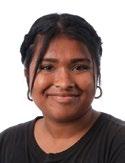
Priya: “I chose to take A Level PE, as I have always had a great interest in playing sport, and having the opportunity to combine my passion for physical activity and sport with the science behind how the body and mind work, as well as how sport has developed and its role in society is really fascinating to me!”
Marissa: “I chose PE as it was a really enjoyable subject at GCSE and I wanted to see the subject in a different way through A Level, focusing more on the societal changes and how that reflected in sports through time.”
Priya: “What I like best about the course is the variety of topics covered and how broad the course is covering everything from anatomy and psychology to sport in the pre-industrial times, giving you the chance to discover which areas of PE you enjoy most. Additionally, of course, the PE teachers are great at making the lessons really engaging and fun, with a mix of theory and practical aspects to help understand the content thoroughly!”
Marissa: “My favourite thing about the course is the way the lessons are structured. We take time to ensure everyone understands what we have been through and sometimes content has been adapted to make it more fun to learn. The worksheets given in lessons are extremely helpful and are easy to revise from.”
Priya: “I hope to go on to study Sports and Exercise Science at university, and therefore studying PE at A Level has given me a great foundation and helped me explore the different areas of sport to see where I want to specialise in the future.”
Marissa – “I hope that PE A Level, especially the anatomy and physiology and the psychology topics, will help my future studies in a Psychology Degree where I can focus more on the mind, brain and behaviour and the way personality can affect different people in different ways.”
A Level Physics gives you the opportunity to explore the phenomena of the universe and to look at theories that explain what is observed. Being in a highly respected A Level, in physics you will study every part of the universe, from the largest galaxies (and indeed the universe itself), to the very smallest subatomic particle. Studying physics also allows you to examine, and understand more clearly, the concepts that underpin many of the other sciences including chemistry, astronomy and engineering.
We follow the OCR Physics A specification as a linear course which comprises of the following units.
• Development of practical skills
• Foundations of physics
• Forces and Motion
• Electrons, waves and photons
• Newtonian world and astrophysics
• Particles and medical physics
With the removal of exams at the end of Year 12, we have taken the opportunity to adapt our teaching orders to make the course of study more dynamic and more appropriate to the level of our students. We have recently renewed and added to our practical facilities and complete practical work as often as possible.
Support is offered in lessons and with a weekly physics club.
You will also have the opportunity to challenge yourself through our Advanced Maths and Physics Club in which we take both subjects well beyond A Level and explore their intrinsic link. All A Level students are encouraged to participate in the Physics Olympiad. Another main highlight is Cern trip to Geneva, Switzerland – very interesting and informative.
Where could it lead?
Physicists are always in demand, one of the most sought-after subject at Universities. The choice of further study is vast, not least the study of theoretical Physics, Medical Physics, Astrophysics, engineering, radiography, technical theatre, architecture, Finance, Maths, economics, PhDs, information technologies and many more.
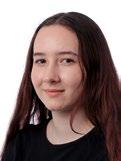
Julia: “I chose physics because I am interested in learning about the world around me and how it works. It has provided me with a theoretical framework for other subjects such as maths and computer science. It has taught me many transferable skills like problem solving, critical thinking and data analysis.”
Arushi: “I chose Physics at A Level because it is fascinating to learn how physics can explain both everyday phenomena alongside pioneering innovations such as nuclear fusion. Moreover, it challenges me to stretch myself and answer more difficult questions aiding me in my further mechanics studies.”
Julia: “I enjoy learning about topics in more depth than at GCSE and studying new topics such as quantum physics.”
Arushi: “The support that the teachers give us is immensely helpful, as they provide us with many consolidation materials and resources that ensure my understanding of the subject is complete.”
Julia: “I wish to study computer science at university and physics has provided me with skills and knowledge to give me a base understanding of how computers work on a quantum level.”
Arushi: “I hope to study engineering at university and so the quantitative skills I have gained from the course will be vital in furthering my higher-level education.”
Psychology is the science of mind, brain and behaviour. It is a subject at the frontier of scientific discovery and, as researchers gradually reveal the secrets of the human brain and how it relates to behaviour, an understanding of psychology has become important across many areas of employment.
We follow the AQA Psychology fully linear course, with assessment being on 3 terminal exams at the end of two years. We study the following topics:
Year 12
• Social Influence
• Attachment
• Memory
• Psychopathology
• Biopsychology
• Approaches
Year 13
• Schizophrenia
• Relationships
• Aggression
• Research methods
• Issues and Debates
The exams involve a mixture of multiple-choice questions, short and longer answer questions and questions that require students to apply their knowledge to real life scenarios.
Universities accept A Level Psychology as an excellent foundation for a wide range of degree courses. It is an asset in the health professions, law, teaching, advertising and marketing, human resources, general management, the police and the media. In recent years around a quarter of students have gone on to Psychology degrees at universities such as Oxford, Kings College London, Nottingham, and Southampton. Others have been accepted onto a range of courses including Law, Medicine, Dentistry, Midwifery, Nursing, Architecture, Mathematics, Criminology, Sociology, English Literature, History and Art Foundation.
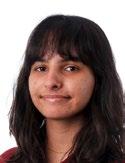
Diya: “I chose Psychology as it tackled human behaviour through a more scientific lens which greatly interested me – psychology connects so closely with everyday life that I thought it would be valuable to learn more about what motivates us to act the way that we do. I knew it was going to be my most fascinating A Level subject!”
Louisa: “I love that with psychology there is something for everyone: it covers a broad range of subject matters from biological content to real world issues such as aggressive crowd behaviour and eyewitness testimony. It also gives you the opportunity to develop a number of different skills like analytical thinking and debate. Most of all, I enjoy applying what I learn to real life and generally gauging a better understanding of people and my environment.”
Maya: “A Level Psychology has provided me with a foundation to pursue a career in psychiatry. It has a built on my biological understanding of the functioning of the brain by taking mental processes and behaviour into account. Additionally, it is considered a science by many universities and their respective courses, broadening choices into courses such as criminology, neuroscience, law and education. I have developed many key transferable skills such as critical thinking, data analysis, and ethical awareness. These learned abilities will equip students with transferable skills highly valued across a range of sectors. Furthermore, topics and techniques learnt from lessons such as memory can be applied to make daily studies at university more efficient.”
Exam Board Pearson
By studying A Level Spanish you will develop a lasting appreciation of the Spanish language, the ability to comprehend the language in a wide range of contexts, the ability to communicate readily in Spanish for a variety of purposes, useful knowledge of and insights into the culture of Spain and the Spanish-speaking world and valuable skills for foreign travel, further education and employment.
There are an estimated 437 million native speakers of Spanish in the world, placing it as the second most important language in the world in terms of native speakers.
We follow the Pearson Spanish course, with assessment being on a terminal exam at the end of two years. We study the following topics:
• The evolution of Spanish society
• Culture in the Spanish-speaking world
• Immigration and the multi-cultural society
• The Spanish Civil War
• Franco’s dictatorship and the transition to democracy
• Text: La Casa de Bernarda Alba
• Film: Volver
All A Level students are encouraged to take part in our Year 10 + 12 trip, which will be to Valencia for the academic year 2025/26. In addition to normal lessons, you will also have the chance to have individual or small group lessons with our Spanish assistant.
The course will give you a good foundation for further study in higher education. Spanish is in demand in a wide variety of professions including banking, international trade and commerce, import and export, tourism, foreign office, diplomatic corps, teaching, translating, interpreting and many more.

“I really enjoyed Spanish at GCSE and wanted to further my language and communication skills by taking on a language at A Level. I wanted to achieve partial fluency at a third language and the topics at A Level interest me lots, such as Music, Tourism and more.”
What I like best about the course...
“The thing I love best is the resources provided in lessons, as I can revise very easily from them, and the teachers are more than happy to answer any questions I have in lessons, making it easier to correct mistakes and further my understanding. Not only this, but we meet every week with a speaking assistant to improve our speaking skills which is essential for the oral exam and future use of the Spanish language.”
Where I hope it will take me…
“I hope that A Level Spanish can help me in the future with careers in international sectors, a range of higher education options, and jobs that require good communication, critical thinking skills and incredible cultural awareness. I hope that maybe I can study abroad or combine Spanish with my main degree too.”
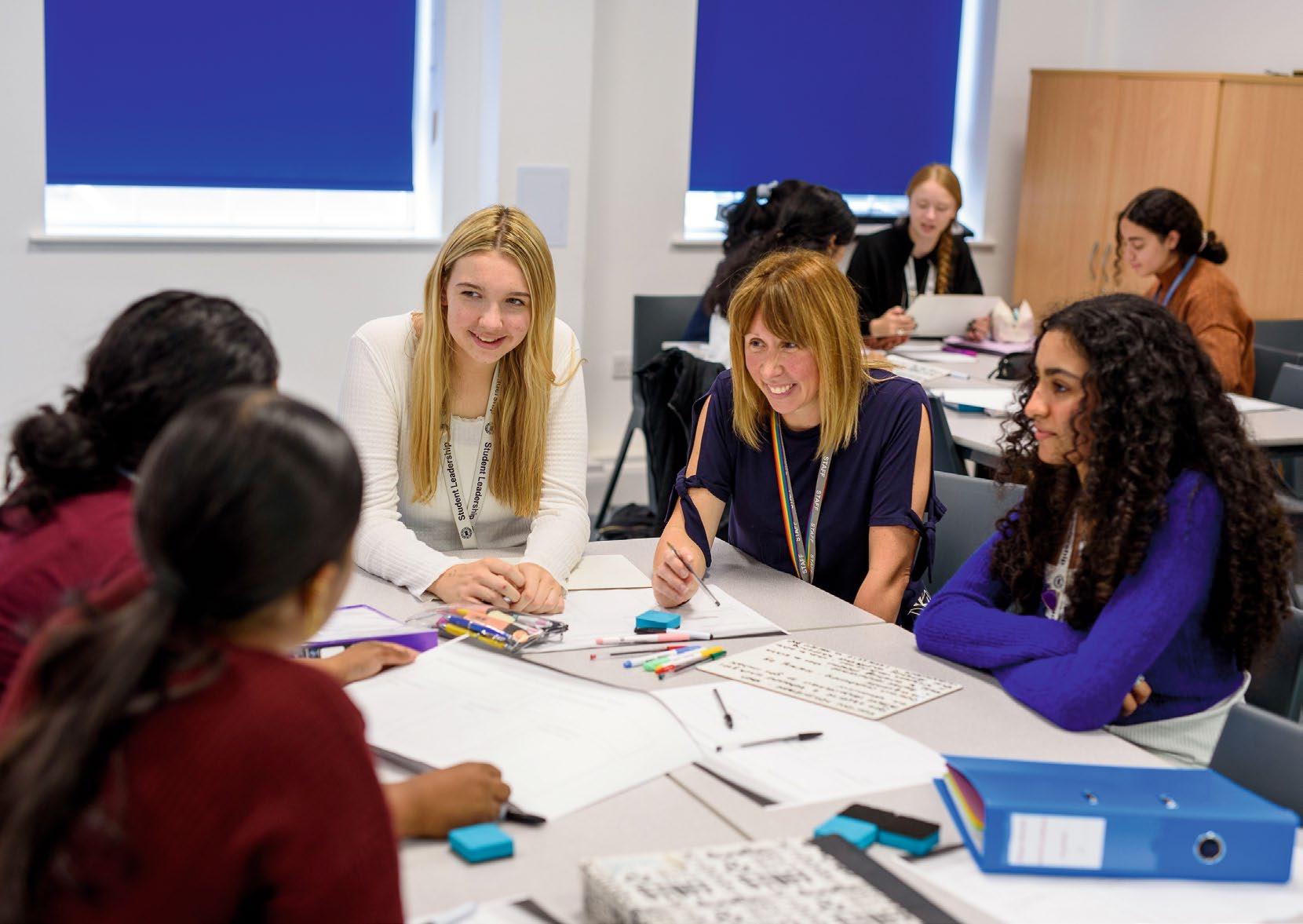
Mrs Williamson – Headteacher
Ewell Road, Cheam, Surrey SM3 8AB
T: 020 8394 3400
E: office@nonsuchschool.org www.nonsuchschool.org
